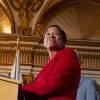Massachusetts governor-elect Maura Healey made history Tuesday not only as the first woman elected to the top job in the Commonwealth, but also as the first out lesbian elected governor in the U.S. It was one of several history-making results from yesterday's election. Erin O'Brien, associate professor of political science at UMass Boston, joined GBH’s Morning Edition hosts Paris Alston and Jeremy Siegel to talk about what the election means. This transcript has been lightly edited.
Jeremy Siegel: What message do these results send? What do we learn from these results in Massachusetts?
Erin O'Brien: We learned that Massachusetts is really slow to elect women, but it eventually happens. She's the first popularly elected female, as has been covered. And I think that speech was telling in that she did not run on her presence as a female, as an out lesbian. It obviously was part of the campaign, but it wasn't a part of her narrative. It wasn't a part of her speeches. It was a part of who she is. But she didn't make it an active part of the campaign. And once she won and she won big, then she was freed in some ways and really said, yeah, this is a big deal and this sends a message to little girls and boys in the polity. I was struck by the juxtaposition between how she ran and then once she won, her calling out her historic victory.
More Politics
Paris Alston: That is a very important point there, Erin. And it wasn't just Healey. Kim Driscoll is joining her administration after being elected lieutenant governor. Andrea Campbell was elected attorney general, the first Black woman in the state to do that. Erin, what does this slate of new leadership mean for the Commonwealth, policy-wise?
O'Brien: All the research suggests that descriptive and substantive representation matters here for women. I already said little girls, little boys, they see these women running and it becomes a norm. But it's not just a feel-good proposition. It's also substantive representation that women do legislate differently. That's not to say they legislate only as women, or that they govern only as women. They care about reelection just like everybody else and rewarding their constituency. But after that, women prioritize different issues. It's not that they don't sometimes vote the same. It's that we can expect that Maura Healey and Andrea Campbell, where they choose to spend their energies will look a little bit different. Not totally different, but a little bit different than where Deval Patrick and Charlie Baker did.
"Women prioritize different issues. It's not that they don't sometimes vote the same. It's that we can expect that Maura Healey and Andrea Campbell, where they choose to spend their energies will look a little bit different."-Erin O'Brien, UMass Boston associate professor of political science
Siegel: Beyond the wave of women candidates that are taking control statewide, it's also a big night, a big result for Democrats. When you compare it to what's happened nationally, Republicans didn't get the red wave that they were hoping for across the U.S., but it looks like they could take control of the House. Here in Massachusetts, it's about as far from a red wave as you can get. I'm thinking about how this is an end of eight years of Republican control of the governor's office in Massachusetts, and Democrats won big. Are we seeing a step from more moderate politics towards progressive politics across the commonwealth?
O'Brien: You know, I think that might overstate it some, because a lot of moderate Democrats and even conservative Democrats got elected to the state legislature. However, what's changed is moderates had no choice last night. Charlie Baker wasn't on the ballot. I think this is a real repudiation of Geoff Diehl and Jim Lyons. Institutionally, as the party organization of the GOP, they made a gamble that if they went Trumpy, they could get new voters and voters who have felt left behind in Massachusetts. And they bet wrong.
"A lot of moderate Democrats and even conservative Democrats got elected to the state legislature. However, what's changed is moderates had no choice last night."-Erin O'Brien, UMass Boston associate professor of political science
Alston: So, Erin, as you mentioned, Maura Healey is the first woman who was popularly elected to the governor's office. But Jane Swift, a Republican, served as governor when she took over for Governor Paul Cellucci after he became U.S. ambassador to Canada in 2001. So besides how those two women got into office, what's different this time around? What are some of the challenges that Healey may face that Governor Swift didn't?
O'Brien: I think one thing that's different is, you know, Governor Swift tried to run again, and good old Mitt Romney came along and said no, and bullied her out of it, basically. I mean, he won in the primary, and kept her from running. And no one bullied Maura Healey out. In the past, if it was the last two females standing Sonia Chang-Diaz and Maura Healey on the Democratic side, a male Democrat would have gone in because they would have sensed an opening. And that didn't happen this time.
In terms of what challenges they face, Maura Healey has the advantage of being popularly elected by a considerable margin. So she comes in with some respect. Jane Swift was treated as sort of the accidental governor. The analogy I use is oftentimes governors or presidents get 100 days. People of color, women, they get about 30 days. So, yes, Massachusetts can elect this woman and do so overwhelmingly, but she doesn't get the 100 days grace period. She's more apt to be called out. Some of those attacks that will come in won't be necessarily substantive. They will include some sexist references. But it's still important. Massachusetts elected her and elected her overwhelmingly.











